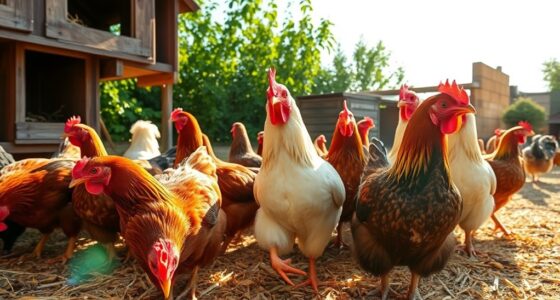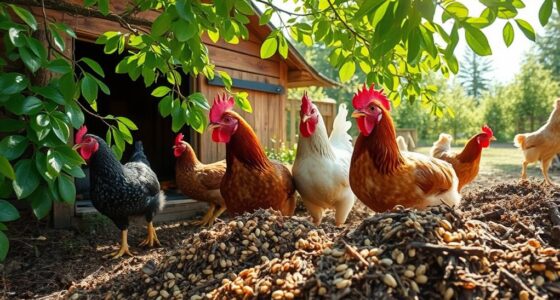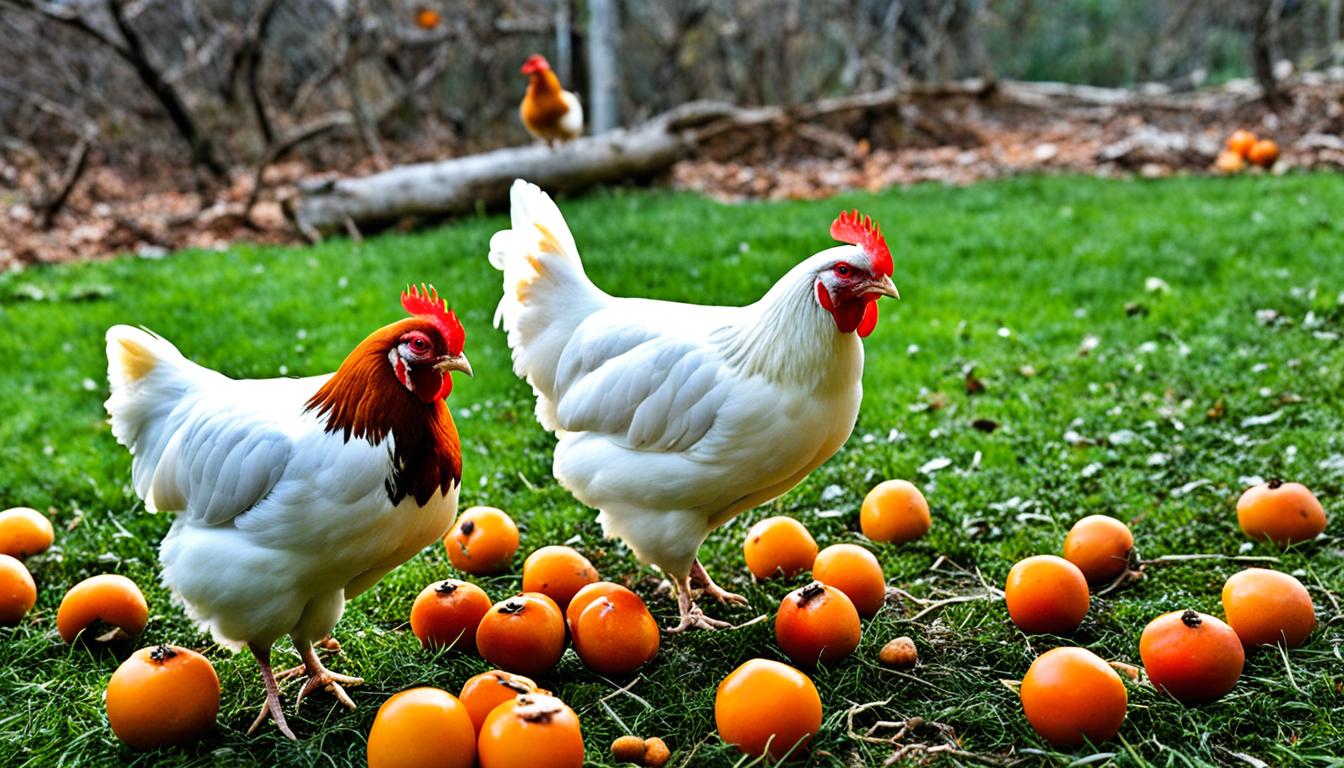When offering potato peels to chickens, it is important to be careful because of the potential dangers of solanine found in green peels. It is essential to steer clear of green potato peels as they can lead to stomach problems, inflammation, and even death in chickens.
If you're looking to keep your chickens safe while enjoying potatoes, pay attention to signs of solanine poisoning and consider the precautions highlighted in our research.
Key Takeaways
- Avoid green potato peels containing solanine toxin.
- Test small portions for adverse reactions.
- Limit or avoid feeding potato peels to chickens.
- Discard green peels and offer non-green parts only.
- Monitor chickens for any signs of distress post-consumption.
Risks of Feeding Potato Peels to Chickens
Feeding potato peels to chickens poses significant risks due to the presence of solanine, a toxic compound that can cause stomach upset and inflammation in the birds. Solanine, found in green potato peels, is harmful to chickens and can even lead to organ damage or death. It's important to note that cooking potato peels doesn't eliminate solanine, making it crucial to avoid feeding any parts of white or red potato plants to chickens to prevent solanine toxicity in these birds.
While potatoes can be a nutritious addition to a chicken's diet, precautions must be taken to ensure their safety. Toxicity from potatoes not only affects chickens but also poses risks to humans and other animals. To make potato peels safer for chickens to consume, baking them at 350°F for 30 minutes can help reduce the solanine content. By taking these measures, chickens can enjoy the benefits of potatoes without the dangers associated with solanine poisoning.
Signs of Solanine Poisoning in Chickens
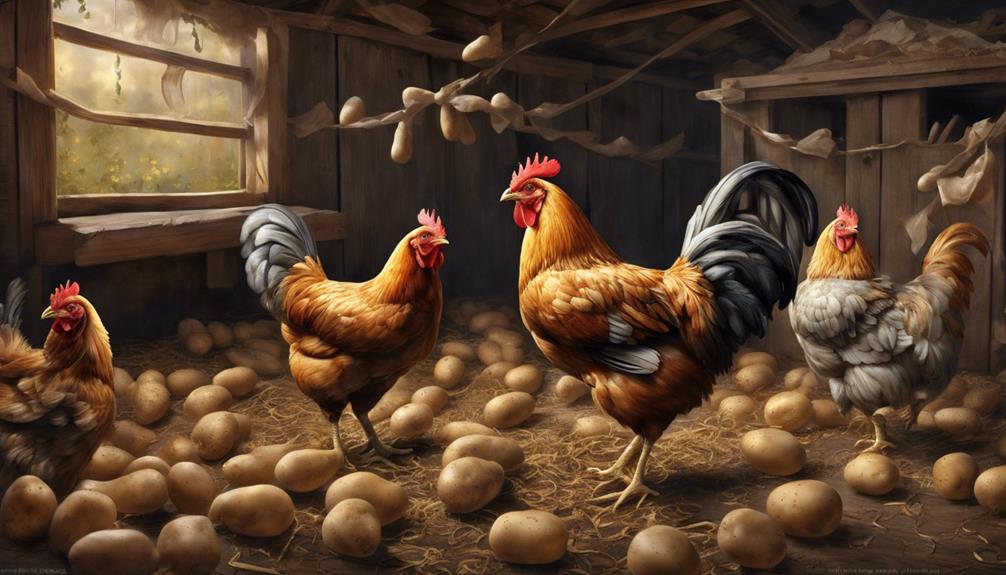
Solanine poisoning in chickens can manifest through symptoms such as vomiting, paralysis, and potential fatality. Exposure to light triggers the formation of solanine in potato peels, increasing toxicity risks. Green potato peels indicate the presence of solanine, a toxin harmful to chickens. Symptoms of solanine poisoning in chickens can manifest as gastrointestinal distress and neurological issues. Preventing solanine poisoning involves avoiding potatoes with green patches and storing them away from sunlight.
| Sign of Solanine Poisoning | Description |
|---|---|
| Vomiting | Chickens may exhibit excessive vomiting. |
| Paralysis | Chickens might experience paralysis. |
| Fatality | In severe cases, solanine can lead to death. |
Nightshade plants, like potatoes, produce solanine as a defense mechanism. The green hue in potato peels signifies increased solanine levels, posing a risk to chickens when consumed. Understanding these signs of solanine poisoning is crucial for poultry keepers to ensure the well-being of their flock.
Precautions When Offering Potato Peels
Have we considered the potential risks associated with offering potato peels to chickens? When providing potato peels to our feathered friends, it's crucial to take certain precautions to ensure their safety and well-being. Here are some key points to keep in mind:
- Avoid Green Potato Peels: Green potato peels contain high levels of solanine, a toxic compound harmful to chickens. It's important to discard green potato peels and only offer them the non-green parts.
- Test Small Portions First: Before introducing potato peels as treats, it's advisable to test them with the chickens in small quantities. This precaution allows us to observe any adverse reactions and adjust accordingly.
- Limit or Avoid Completely: Due to the potential risks of solanine poisoning, it may be wise to limit the amount of potato peels given to chickens or even avoid them altogether. This cautious approach can help prevent any harm to our poultry friends.
How to Prepare Potato Peels for Chickens
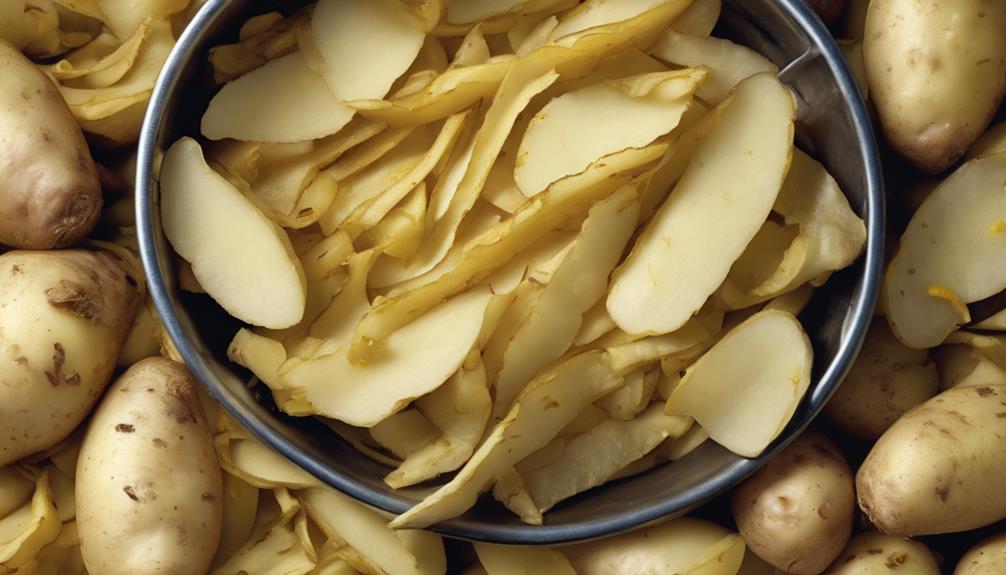
When offering potato peels to chickens, it is essential to properly prepare them to ensure the safety and well-being of our feathered friends. Potatoes belong to the nightshade family and contain a toxic substance called solanine, which can be harmful if consumed in large quantities. To make potato peels safe for chickens to eat, follow these steps:
| Preparation Steps | Details |
|---|---|
| Wash potato peels thoroughly | Remove dirt and debris before baking. |
| Dry the potato peels after peeling | Ensures even baking and crispiness. |
| Bake potato peels at 350°F for 30 minutes | Reduces solanine content, making them safer for consumption. |
| Space out the potato peels on a baking sheet | Ensures even cooking and crispy texture. |
| Cool the baked potato peels before serving | Cut into smaller, bite-sized pieces and allow them to cool before feeding. |
Monitoring Chickens After Eating Potato Peels
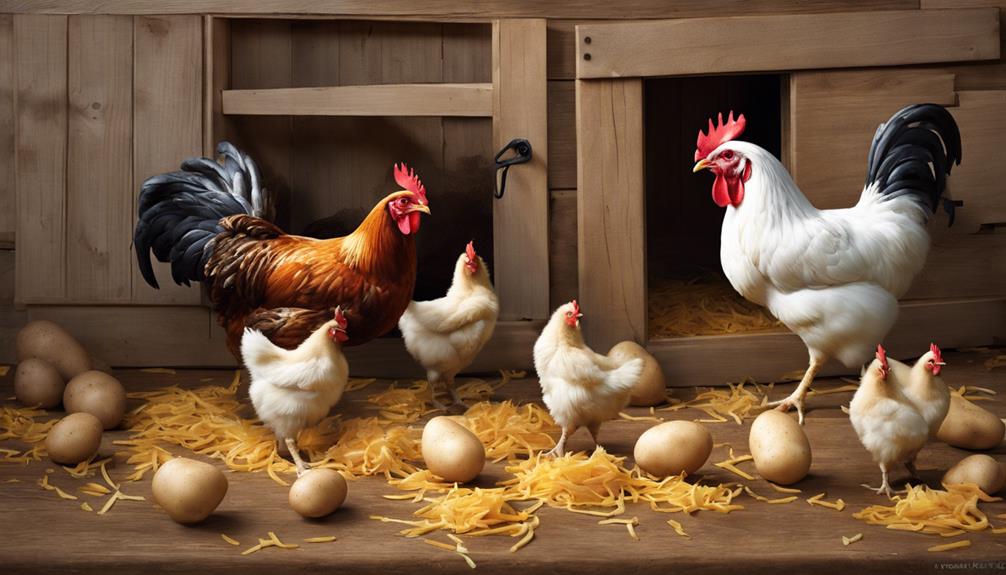
After chickens have consumed potato peels, closely monitor their health for any signs of digestive distress or adverse reactions. Potatoes contain solanine, a toxic compound that can be harmful to chickens if consumed in large quantities. Here are some key points to consider when monitoring your chickens after feeding them potato peels:
- Watch for Physical Symptoms: Keep an eye out for any stomach upset, itching, or inflammation in your chickens. These may indicate an adverse reaction to the potato peels.
- Observe Behavioral Changes: Check for abnormal behavior such as decreased egg production or changes in droppings. These could be signs of digestive issues following the consumption of potato peels.
- Monitor Overall Well-being: Look for any signs of distress, lethargy, or allergic reactions in your chickens. It's crucial to ensure the overall health and well-being of your flock after introducing potato peels into their diet.
Frequently Asked Questions
Can Chickens Eat Potato Peel?
Yes, chickens can eat potato peels, but caution is necessary. Potentially toxic compounds in raw peels can harm chickens, so cooking is essential. Baking at 350°F for 30 minutes reduces these risks.
Green peels are especially dangerous due to high solanine levels. Feeding peels as occasional treats, not a staple, is wise.
Cooked potato peels offer essential nutrients like potassium and vitamin B3, enhancing chicken diets when used in moderation.
Are Raw Potatoes Safe for Chickens?
Raw potatoes pose a danger to chickens due to solanine, a harmful substance present in the peels. This compound can cause severe health issues and even death.
Cooking or baking potato peels thoroughly at high temperatures reduces the solanine levels, making them safer for consumption.
It's vital to never feed chickens raw potato peels. Always opt for properly cooked or baked peels to ensure the safety of your feathered friends.
Can Farm Animals Eat Potato Peels?
Yes, farm animals can safely consume potato peels if baked at 350°F to reduce solanine toxicity. Green potato peels, however, should be avoided due to their harmful toxin content. Moderation is crucial to prevent health issues, and testing with small portions can help determine tolerance. Providing alternative treats like sweet potatoes or cooked meat can offer diet variety for farm animals.
What Table Scraps Can You Feed Chickens?
We can feed chickens a variety of safe and nutritious table scraps like eggshells, leafy greens, and cooked meat. Balancing treats to about 10% of their diet ensures they get proper nutrition from commercial feed.
Monitoring the quality and variety of scraps is crucial for their health. Remember to avoid harmful substances like chocolate, avocado, onions, or garlic, and always provide a balanced diet to keep our feathered friends happy and healthy.
Can Chickens Safely Eat Composted Chicken Bones?
Yes, chickens can safely eat compost chicken bones easily. Composted chicken bones are a good source of calcium and nutrients for chickens. As long as the bones are properly composted and broken down, they can be a beneficial addition to a chicken’s diet.
Conclusion
In conclusion, feeding potato peels to chickens can be risky due to the presence of solanine. It's important to monitor your flock for signs of poisoning and take precautions when offering this treat.
Remember, 'you can't put all your eggs in one basket.' By following proper guidelines and preparing potato peels safely, you can enjoy watching your chickens indulge in this occasional snack without any harm.
Stay vigilant and keep your feathered friends healthy!




